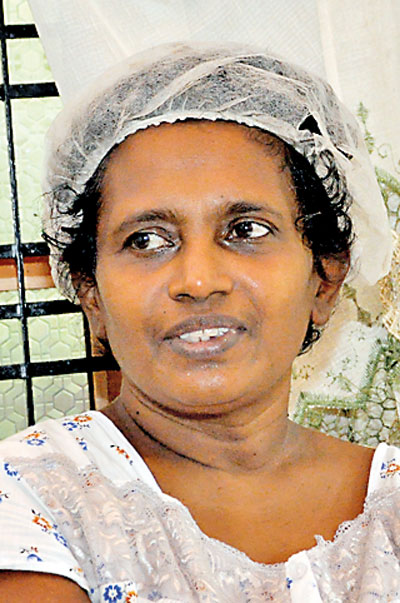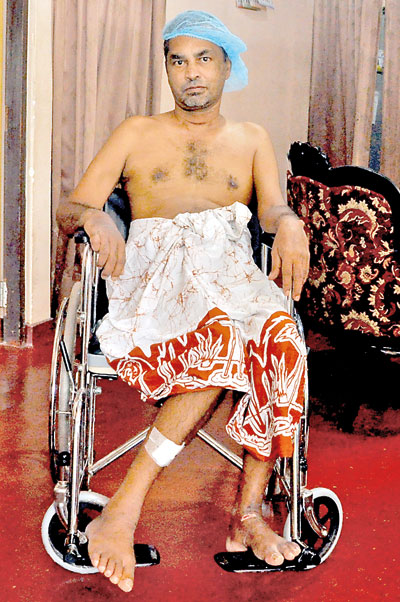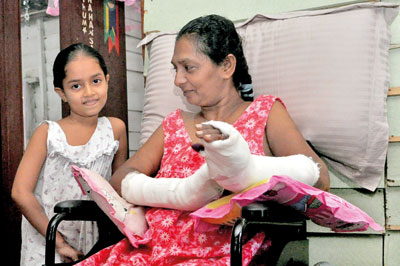News
Bureaucracy denies church bomb victims medicine, payouts
While the shock of the suicide bomb attacks on Easter Sunday is beginning to fade and the people are resuming their day-to-day activities, the injured and the families of the dead are struggling to return to a normal life.

Samanmalee Fernando
Many are still unable to come to terms with the loss of their loved ones and are unable move on with their lives, while the dead are now a memory and the severely injured are in agony.
Their physical disabilities and mental anguish will be long-term.
Some families suffered double blows as in the case of Rajitha Dhanushka, 39, an automobile electrician in the Sri Lanka Navy, who has lost his nine-year-old daughter Roshini Sathruvani at the Katuwapitiya St. Sebestian church that fateful day.
Dhanushka is still nursing his injuries. His knee is damaged. Also, doctors have said that it is too risky to surgically remove shrapnel in his ribs.
He received a mere Rs. 25,000 from the government, which had publicly promised Rs 500,000 for the injured.
Prasanna, 50, who was in the intensive care unit of the Colombo National hospital after suffering severe head injuries, is paralysed on his left side. He has lost a part of his skull along with a section of his brain – his speech is incoherent and his mind is unable to grasp the gravity of the situation he is in.
He needs to be taken for physiotherapy every week to Ragama hospital.
A poultry farmer, he will no longer be able to work.
His children, 16 and 17 year-old boys, are still schooling and cannot become the breadwinners.
His wife Marie, 48, helps to move him from the bed to the wheelchair and back.
Prasanna received just Rs. 100,000 from the government. They are appealing.

Prasanna: A poultry farmer, he will no longer be able to work
Nayani Rasika, 46, has suffered severe injuries to her hands. Both her hands are in a cast and doctors have inserted two plates into her right leg. Her eight-year-old daughter, Dhulashini, had four shrapnel removed from her body from different areas. The husband undertakes home decor work such as painting and earns a daily wage.
They have applied for government compensation and are awaiting a response.
Samanmalee Fernando, 46, has suffered severe head injuries and a part of her skull has been torn off. She underwent brain surgery and skin grafting. Paralysed on the left side, she has to use a wheelchair. The husband, a three-wheeler driver, cannot go back to work as she has no extended family to care for her.
These wounded innocents are some of the victims of the suicide bomb blasts at Katuwapitiya Church. Several others may be in even worse situations. All of them said that they have been let down by the government which had promised Rs. 500,000 to the injured persons.
Although families of the dead have been paid Rs. 1 million, the injured people who need more care and financial help have been abandoned.
Some families said they had not received any compensation yet and are spending huge amounts on medical expenses and care for injured family members.
In addition, the public hospitals, which should provide free pharmaceuticals, have been passing on the burden to families, pressuring them to purchase expensive medicines and injections from private vendors.
For some patients who need 24-hour care, caregivers have to be hired at Rs. 2,500 a day. This is a heavy financial burden on patients who are financially stricken, with elderly patients becoming a far greater responsibility.
As for bomb victims of the Kochchikade St. Anthony’s Shrine, the story is different. As the church is not a parish, it is unable to count the number of the dead, or the injured, as many people had come from far and wide.
Fr. Lawrence Ramanayake of the Colombo Archdiocese, said people had come from several districts for the Easter Sunday service. Only around 50 families injured are from the Kochchikade and Mattakkuliya areas.
People have returned to their hometowns and reported to their parish. The Colombo archdiocese is still collecting details of the dead and injured.

Nayani Rasika and daughter Dhulashini. Pix by Priyantha Wickramaarachchi
The archdiocese has received donations from many non-government organisations, overseas missions, leading institutions, local organisations and banks. These funds are being distributed to families of the dead and the injured.
Under the psychosocial and pastoral support programme for the affected families, the church has donated money to families of the dead. For the injured, the outreach includes spiritual help, counselling and social assistance.
While they are helped to be spiritually strong through pastoral visits and prayers they are also visited by counsellors to help them overcome their grief.
As for social help, victims’ medical bills, living expenses mid-to-long term, as well as living, housing and legal help, are provided.
For children who have been orphaned, the church plans to provide for them until they reach adulthood.
The church has identified 10 orphans and under the Seth Sarana scheme the archdiocese will care for the children and educate them until they are 18 years and are able to stand on their own feet.
Also there are plans to provide legal support with regard to inheritance from the dead.
The victims of the Zion Church, Batticaloa, however, are facing several problems. There have been 29 deaths and 86 injured in the suicide bomb blast.
Pastor Roshan Maheshan, said the compensation is not adequate. He said that payments are decided based on the medical report by the doctor who treated the wounded.
It is learnt that for some of the wounded, doctors have ranked them high on on a 10-100 scale given by the government. This would mean that a person with a minor injury would be eligible for higher compensation than a victim who has sustained a severe head injury, or is paralysed because of shrapnel.
Pastor Maheshan said that a woman who suffered shattered knees of both limbs and is bedridden, has got only 70 marks and is still been queried by the Divisional Secretariat saying that the scale is high.
The Divisional Secretary, M. Dayabaran, said however, that the Office of Reparation has sent back the documents requesting that the degree of injury be re-assessed. “Around 20 applications have been sent back in this way and has been sorted out,’’ he said.
The acting director general, M. K. Ananda Wijepala, of the Office for Reparation under the Ministry of National policy, Economic Affairs & Rehabilitation, said medical certificates were returned to verify the degree of injury.
About 65 have been injured and only 42 applications received. Some are still recuperating in hospitals and there is no deadline to apply, he said.
Applications can be handed over to the district secretariat and payments will be made within a week.
He said that if documents are in order, payments will be made in a week.
The Batticaloa Teaching Hospital, on its part, has been taxing the church to buy medicines for the injured. The church had so far spent Rs. 800,000 for medicine.
Apart from this, 26 motorbikes, several three-wheelers and personal belongings, such as handbags, had been seized by the police and handed over to the courts. The items have not been released.
People complain they are unable to return to work. Three-wheeler drivers say they are unable to accept hires.
The church had to hire two lawyers to file a lawsuit to retrieve the seized items. Several personal items of the congregation are also missing. The case will be heard on June 6.
Compensation for deaths has been only 90%. The government is holding back Rs.100,000 for the want of death certificates. It is understood that the death certificates had not been issued as the Batticaloa coroner been transferred to Mahiyangana.

